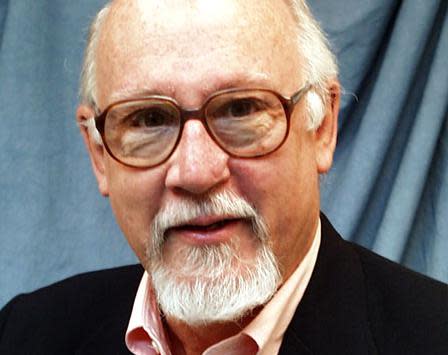Novel paints a picture of the future and it's not pretty | DON NOBLE
- Oops!Something went wrong.Please try again later.
- Oops!Something went wrong.Please try again later.
“Lark Ascending” is a beautiful novel.
It is terrifying, depressing, exciting, hopeful and beautiful. The world has gone mad, but individual humans can still bond and love and save one another.
Silas House has taken his turn here at a very particular kind of novel — the story set in the future. These novels are rarely utopian.
It is a convention, in religion and literature, and sometimes in the popular imagination, that the perfect time, even the relatively good time, is in the past — perhaps in the Garden of Eden or in the 1950s, those Happy, Mayberry Days.
More:Novel set in 1960s presents home-grown civil rights activism | DON NOBLE
Some future novels stop at describing a society, a culture, gone awry. In George Orwell's "1984," published in 1948, technology has enabled the government to observe everyone's behavior all the time. Big Brother is watching you and insists that you follow "his" rules.
In "Brave New World," by Aldous Huxley, published in 1932 and set, optimistically one might say, in 2540, all human behavior is controlled by the government, from test tube babies to euthanasia, and potentially restless citizens are kept calm with "soma," a tranquilizing drink.
More recent novels and darker novels of the future tend more toward the book of Revelations than Genesis. They are more often apocalyptic or post-apocalyptic.
Nevil Shute’s “On the Beach” was published in 1959 during the anxiety of the Cold War. Set in 1963, Shute writes of some of the last living humans, living in Australia, where the gigantic atomic cloud circling the earth has not yet drifted. The war that started that holocaust, Shute tells us, began when Albania dropped an atom bomb on Italy.
More recently in Cormac McCarthy’s “The Road,” a father and son are walking across the Deep South, heading for the Gulf of Mexico, searching as they go for canned foods since the land has become sterile — nothing grows. Society has returned to barbarism, including cannibalism.
Different prophets have different visions of the horrors of the future.
Robert Frost had his say on this subject years ago in “Fire and Ice.”
“Some say the world will end in fire,
Some say in ice.”
It turns out fire was, literally, the right answer.
In “Lark Ascending,” our narrator Lark is 90 years old, telling of the years of his youth when he and his family fled from their home in Maryland to the woods of Maine to escape the fires.
Australia burned, then Africa, then most of Europe. The fires in California, which we see often on the evening news, had gone utterly out of control and moved east, jumping rivers, consuming everything. Crops burn. Starvation is widespread, all the cattle and hogs eaten or caught in the fires or themselves starved. Pets have been outlawed, many euthanized rather than allowed to starve.
In the chaos that erupts, there is a kind of civil war. The right-wing Fundamentalists, religious nationalists, known as "Fundies," have risen up and taken over, and are now resisted by the "rebels." Lark’s mother explains: “we have to fight back because they want everyone to be just like them. They want us to follow their rules.”
All homosexuality is banned. Married gay and lesbian couples are “disappeared” as if they were in Argentina 30 years ago. Lark's aunt and her wife are taken away. Catholics and Muslims are detained. "Priests and professors and artists were killed."
Lark and his family walk to Nova Scotia and board a perilously overcrowded sailboat — 140 feet long with 44 people aboard, to get to Ireland, reputed to be one of the last places on earth to accept American refugees. It's not perfect but they decide: "Better to go to an Irish refugee camp than die back home in the fires."
One catastrophe after another ensues and Lark finds himself alone, cast up on the beach in southwest Ireland, but not safe. In Ireland, the British “Nays,” because they say no toeverything, presumably descendants of the Brexiteers, are in charge again and mean to exterminate immigrants, Catholics and people of color. As in America, there are rebels.
Lark, a young gay man, has lost everyone, family and his true love, Arlo. He is frightened and alone until he finds Seamus, a beagle and perhaps the last dog on the island. Seamus, strong, smart and loyal, had been taught not to bark, a crucial skill in evading patrols.
These two, joined by a strange and powerful old woman searching for her son, will endure hardships and violence and make a “family.” They will trek across Ireland through green lonely meadows and burned-over places to Glendalough, an ancient holy place in the Wicklow Mountains where ley lines cross and produce a “thin place,” a spot where the wall between this world and the next is diaphanous.
Only Lark, like Ishmael in " Moby Dick," lives to tell the tale. Others have survived elsewhere but the road back to a kind and humane civilization will be long and uncertain.

Don Noble’s newest book is Alabama Noir, a collection of original stories by Winston Groom, Ace Atkins, Carolyn Haines, Brad Watson, and eleven other Alabama authors.
“Lark Ascending: A Novel”
Author: Silas House
Publisher: Algonquin Books
Pages: 277
Price: $27 (Hardcover)
This article originally appeared on The Tuscaloosa News: Novel paints a picture of the future and it's not pretty | DON NOBLE
